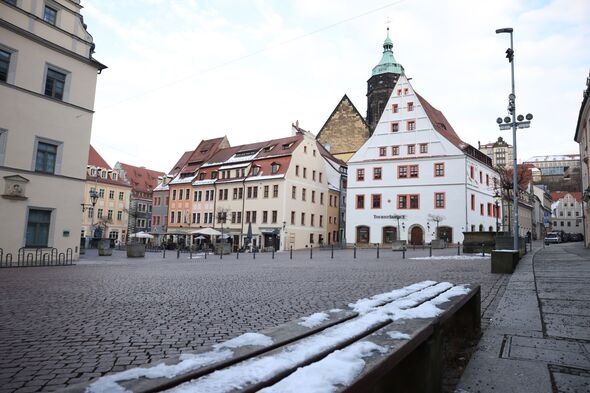Sat outside a coffee shop with a steaming mug of hot cider and a dachshund’s head resting on his knee, a bald man in a red puffa jack waves his hand at our question about the upcoming German election.
“I’m voting Alternative fur Deutschland, there is no question,” he says, “I like everything about them, everything.”
His words raise the eyebrow of another passing Pirna resident, Carsten Lorenz, who most definitely is not voting for the far-right Alternative fur Deutschland (AfD).
“They pretend they’re doing politics for the little man, but it’s not actually that. They are just profiting from topics [like migration] which they’re bringing up in the media.”
Lorenz, who calls the AfD a threat to German democracy, says he is used to seeing “a lot of right-wingers” in the area but gets frustrated that they cannot see how these groups are “dividing people.”
Nestled in rolling hills between Dresden and the Czech border, Pirna is a picturesque town of cobbled streets and arched roofs. It is also the place where the AfD first tasted major electoral success, winning the mayoral vote in 2023.
As Germans prepare to vote in the country’s general election on Sunday, the town is catching the eye of the AfD’s most famous supporter: Elon Musk. Taking to X, the social media platform he owns, Musk posted the results of a mock election held by schoolchildren in Pirna that had the far right party getting 64% of the vote. His caption read: “The kids understand.”
Even still, most of the voters the Express spoke to would first appear anxious before admitting they planned to vote AfD on February 23.
One of those initially reluctant to air her support was 26-year-old Sophia K, who did not want to share her last name.
“The media says all the time they are ‘so right-wing extremist,’ but we have other extremist parties in Saxony,” she says in reference to hard left and Saxon independence groups also running at the election.
Although nervous to talk about the AfD at first, Sophia said calling the party’s supporters “Nazis” was beginning grate with many locals.
“They use these words too easily,” she says. “I mean, we have to think about what Nazis are and what they’ve done. You cannot say to everyone who is not left wing; ‘you are a Nazi.’ That’s not the solution.”
In Saxony, she felt this approach was driving more voters towards the AfD.
“People in this area when they hear; ‘you’re a Nazi,’ they are more like, ‘I don’t care.’ They get angry about it,” she adds.
As she rearranges her scarf in the freezing cold, Sophia is joined by her husband, Amadeus. “For us, it’s important when we have some room or space for discussion because that’s the point of democracy that every opinion is okay,” he said. “But we have noticed that there are less space for [some views] especially in the public media.”
Nicole Kusch, 26, and Anka Kamolz, 31, were two other AfD voters who felt unfairly tarnished by the use of the word Nazi.
